- Home
- Quizzes
- My Quiz Activity
- Newsletters
- Sports Betting
- MY FAVORITES
- Add Sports/Teams
- SPORTS
-
NFL
- NFL Home
- Arizona Cardinals
- Atlanta Falcons
- Baltimore Ravens
- Buffalo Bills
- Carolina Panthers
- Chicago Bears
- Cincinnati Bengals
- Cleveland Browns
- Dallas Cowboys
- Denver Broncos
- Detroit Lions
- Green Bay Packers
- Houston Texans
- Indianapolis Colts
- Jacksonville Jaguars
- Kansas City Chiefs
- Las Vegas Raiders
- Los Angeles Chargers
- Los Angeles Rams
- Miami Dolphins
- Minnesota Vikings
- New England Patriots
- New Orleans Saints
- New York Jets
- New York Giants
- Philadelphia Eagles
- Pittsburgh Steelers
- San Francisco 49ers
- Seattle Seahawks
- Tampa Bay Buccaneers
- Tennessee Titans
- Washington Commanders
-
MLB
- MLB Home
- Arizona Diamondbacks
- Atlanta Braves
- Baltimore Orioles
- Boston Red Sox
- Chicago White Sox
- Chicago Cubs
- Cincinnati Reds
- Cleveland Guardians
- Colorado Rockies
- Detroit Tigers
- Houston Astros
- Kansas City Royals
- Los Angeles Angels
- Los Angeles Dodgers
- Miami Marlins
- Milwaukee Brewers
- Minnesota Twins
- New York Yankees
- New York Mets
- Oakland Athletics
- Philadelphia Phillies
- Pittsburgh Pirates
- San Diego Padres
- San Francisco Giants
- Seattle Mariners
- St. Louis Cardinals
- Tampa Bay Rays
- Texas Rangers
- Toronto Blue Jays
- Washington Nationals
-
NBA
- NBA Home
- Atlanta Hawks
- Boston Celtics
- Brooklyn Nets
- Charlotte Hornets
- Chicago Bulls
- Cleveland Cavaliers
- Dallas Mavericks
- Denver Nuggets
- Detroit Pistons
- Golden State Warriors
- Houston Rockets
- Indiana Pacers
- Los Angeles Clippers
- Los Angeles Lakers
- Memphis Grizzlies
- Miami Heat
- Milwaukee Bucks
- Minnesota Timberwolves
- New Orleans Pelicans
- New York Knicks
- Oklahoma City Thunder
- Orlando Magic
- Philadelphia 76ers
- Phoenix Suns
- Portland Trail Blazers
- Sacramento Kings
- San Antonio Spurs
- Toronto Raptors
- Utah Jazz
- Washington Wizards
-
NHL
- NHL Home
- Anaheim Ducks
- Boston Bruins
- Buffalo Sabres
- Calgary Flames
- Carolina Hurricanes
- Chicago Blackhawks
- Colorado Avalanche
- Columbus Blue Jackets
- Dallas Stars
- Detroit Red Wings
- Edmonton Oilers
- Florida Panthers
- Los Angeles Kings
- Minnesota Wild
- Montreal Canadiens
- Nashville Predators
- New Jersey Devils
- New York Islanders
- New York Rangers
- Ottawa Senators
- Philadelphia Flyers
- Pittsburgh Penguins
- San Jose Sharks
- Seattle Kraken
- St. Louis Blues
- Tampa Bay Lightning
- Toronto Maple Leafs
- Utah Hockey Club
- Vancouver Canucks
- Vegas Golden Knights
- Washington Capitals
- Winnipeg Jets
- NCAAF
- NCAAM
- Olympics
- Boxing
- Entertainment
- Lifestyle
- Golf
- MMA
- Soccer
- Tennis
- Wrestling
- More Sports
- RESOURCES
- My Account
- YB on Facebook
- YB on Twitter
- YB on Flipboard
- Contact Us
- Privacy Policy
- Terms of Service
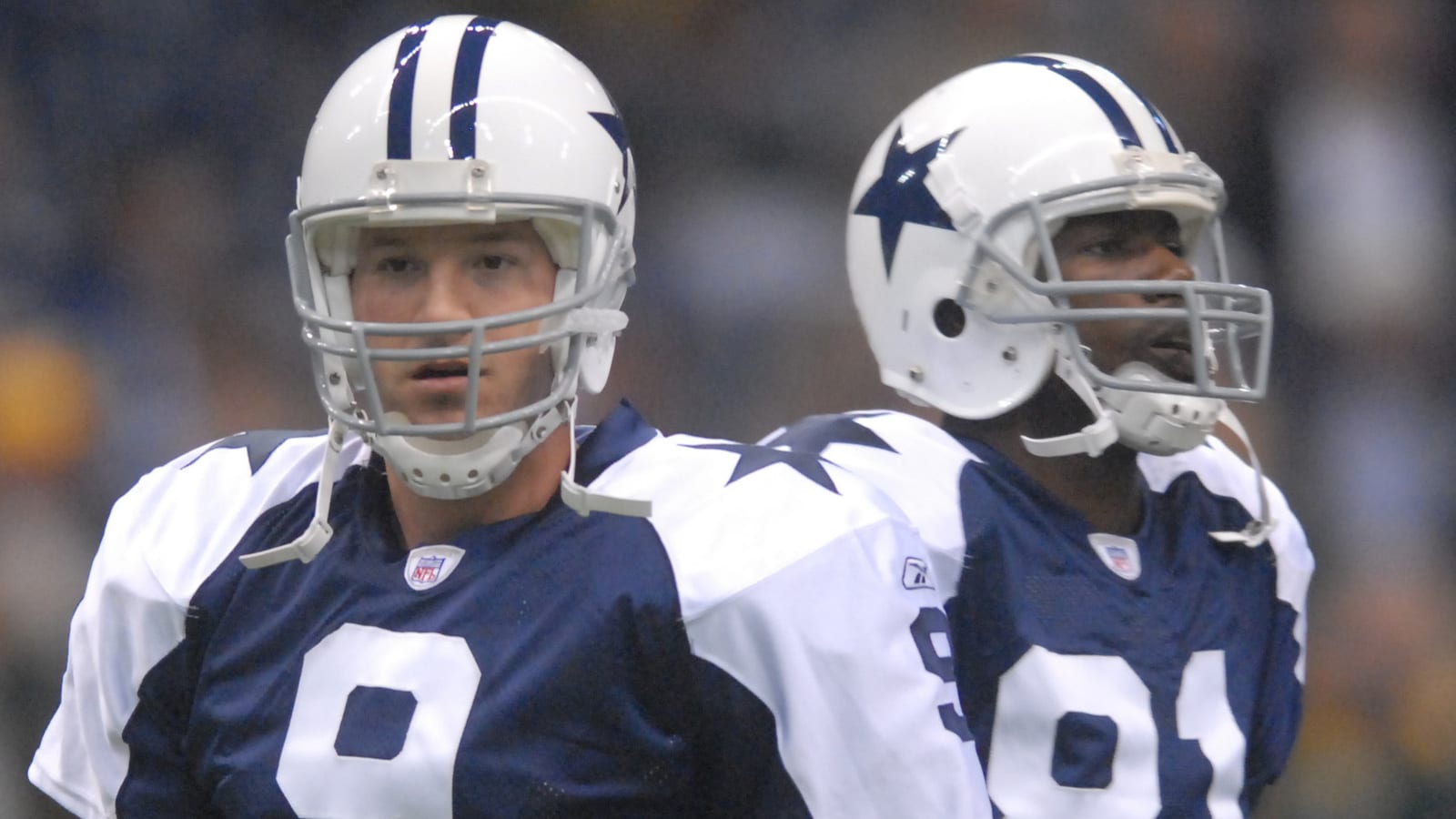
28 NFL teams that failed to live up to the offseason hype
Many teams have justified offseason hype, but summer buzz can lead to bitter disappointment. Other squads have failed to either live up to expectations or keep up with their previous pace, leading to missed opportunities and/or sweeping changes. Here are the NFL's most notable letdown teams since the AFL-NFL merger.
1977 St. Louis Cardinals
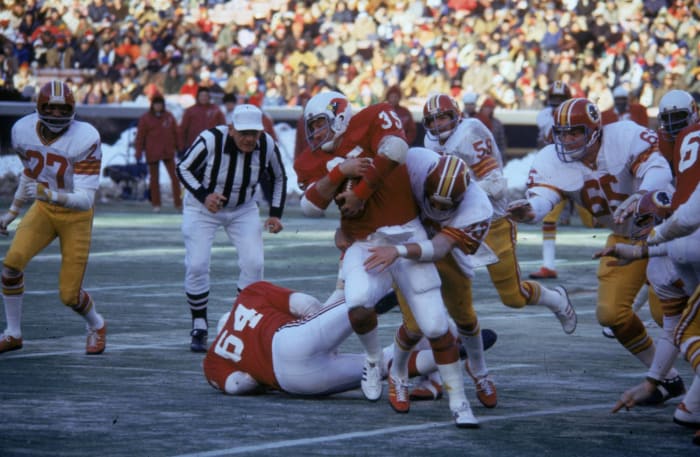
The Cardinals won the NFC East twice in the 1970s, being the only non-Dallas team to do so during Roger Staubach's seven-year run as a full-time starter. This coincided with Don Coryell's Missouri stay. Coryell coached the Cards to three straight 10-plus-win seasons from 1974-76, but the wheels fell off late in the '77 slate. St. Louis lost its final four games to finish 7-7. Owner Bill Bidwill then engaged in a messy divorce with Coryell, barring him from the building. Post-Coryell, who became better known for his Chargers work, the team's high-octane offense (featuring Jim Hart and electric back Terry Metcalf) faded. The Cards did not make a non-strike-year playoff field again until 1998, long after they moved to Arizona.
1995 Miami Dolphins
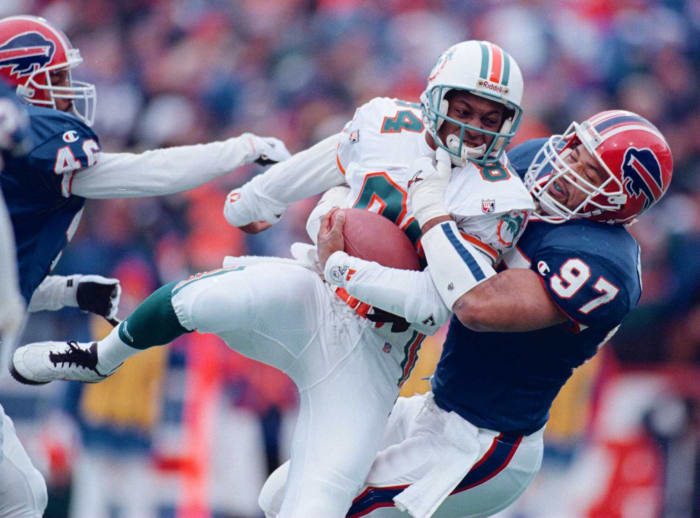
Although the Dolphins made the playoffs in 1995, more was expected. A final-minute missed field goal from the 1994 AFC championship game, Miami loaded up in Don Shula's final year. In Year 3 of free agency, the Dolphins paid up for wideout Gary Clark, defensive end Trace Armstrong, and tight end Eric Green and gave trade acquisition Terrell Buckley a new deal. Shula's finale began 4-0, but Dan Marino's age-34 season slipped to 9-7 and a wild-card slot. Oddsmakers had made Miami that year's AFC favorite, but Shula ended up closing out his storied career with a 15-point loss in Buffalo.
1979 Baltimore Colts
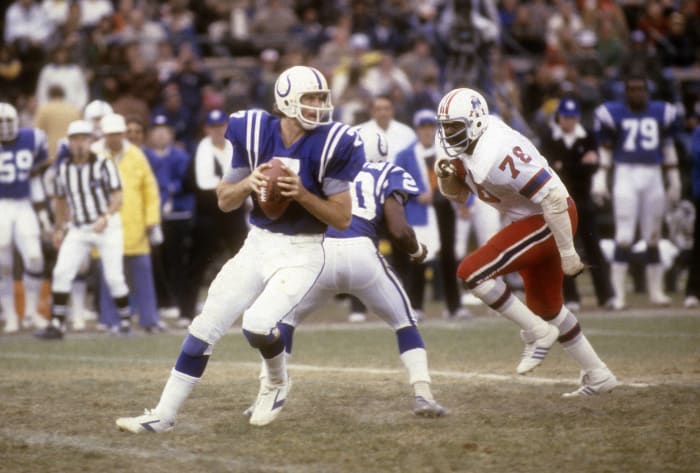
Bert Jones' 1976 MVP season had the cannon-armed passer ticketed for stardom, and the former No. 2 overall pick hovered on that level for a stretch. Jones guided the Colts to three playoff berths from 1975-77 but suffered a shoulder injury during the 1978 preseason. After returning for Week 1 of the '79 campaign, he missed 12 games because of more shoulder issues. Bob Irsay once posited the passer's injury was in his head, per Jones, who fired back at the volatile owner. Jones even, presciently, said rumors of Irsay moving the team were a distraction. Meanwhile, the Colts went 5-11 during a season in which it became clear they had fallen off the AFC playoff tier. The team never made the postseason in Baltimore again.
1987 Los Angeles Raiders
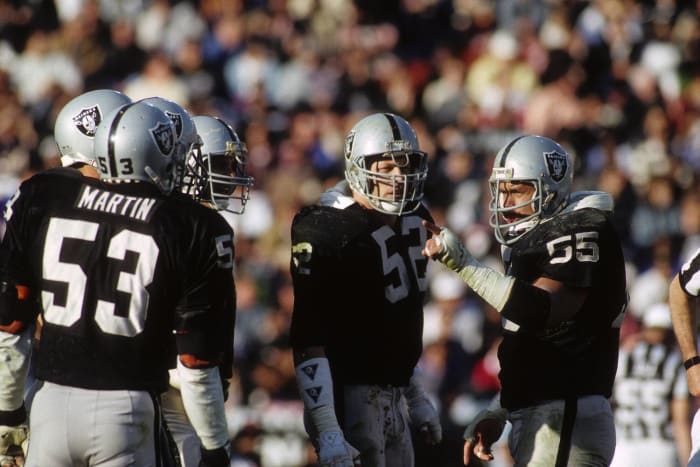
Thanks to Bo Jackson's mesmerizing debut, this team is better known for its highlights than its win-loss record. But the Raiders added both Jackson and future Hall of Fame wide receiver James Lofton in '87. They also rostered Hall of Famers Howie Long, Marcus Allen, and Mike Haynes, along with All-Pro tight end Todd Christensen. But Los Angeles went 5-10, trapping the 1983 Super Bowl team's nucleus in limbo. The main culprit, as it often goes, was the quarterback position. Jim Plunkett retired, leading to sixth-round pick Rusty Hilger getting a shot over Marc Wilson. Neither Hilger nor Wilson, a former first-rounder, was effective during the Raiders' worst season in 24 years. Tom Flores stepped down soon after.
1983 New York Jets

Coming off back-to-back playoff berths, the Jets entered the '83 season on the Super Bowl radar. Following head coach Walt Michaels' offseason departure, the team fell off that perch. The team received full seasons from New York Sack Exchange cornerstones Joe Klecko and Mark Gastineau but went 7-9. An injury to standout running back Freeman McNeil limited Gang Green's offense. Veteran quarterback Richard Todd closed his final year as the Jets' quarterback with an 18-26 TD-INT ratio, dealing another blow to a Jets fanbase recovering from the team's 1983 draft decision to select Ken O'Brien over Dan Marino.
2022 Denver Broncos

The Broncos' trade for Russell Wilson brought expectations. A franchise that had failed repeatedly to find a quarterback post-Peyton Manning dealt two first-round picks to the Seahawks as part of a blockbuster package. The result proved shocking, potentially affecting Wilson's Canton case. The Broncos hired a coach who proved quickly overmatched. Rarely has a Week 1 loss provided a better harbinger of worries ahead than Nathaniel Hackett's 64-yard field goal debacle in Seattle. A disjointed mess followed, with an empowered Wilson struggling in a misguided effort to be a pocket passer. The Broncos went 5-12, making Hackett just the third HC since the merger to be fired before his first season ended.
2017 New York Giants
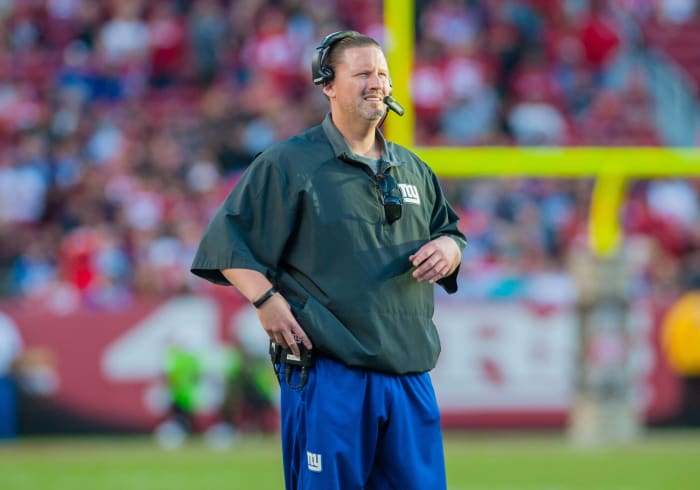
Hovering near the top five in preseason Super Bowl title odds, these Giants began the franchise's rapid descent. They fell from 11-5 in 2016 to 3-13 in 2017. Odell Beckham Jr.'s season-ending injury hurt Eli Manning's team, but GM Jerry Reese's batch of free agent defenders from 2016 -- Olivier Vernon, Snacks Harrison, Janoris Jenkins (pre-Jackrabbit metamorphosis) -- could not offer a repeat effort. The Giants tumbled to 27th in defense and were not good with Beckham healthy. They started 0-5. Ownership canned Reese and Ben McAdoo after Manning's one-game December demotion. Reese's successor, Dave Gettleman, soon sank the team into a deeper abyss.
2000 Jacksonville Jaguars

The NFL's three-year period with 31 teams produced bye-week craziness and a six-team AFC Central, and the 2000 Jags landed in a division with two historically elite defenses. The Ravens and Titans rank first and third, respectively, in the 16-team era in points allowed. Jacksonville's 1999 defense was not far off, but the unit regressed to 16th in 2000. A five-game early-season skid led the Jags -- 14-2 in 1999 -- to 7-9, despite Mark Brunell playing 16 games. Injuries hurt the team; 1999 Pro Bowlers and ex-Steeler teammates Carnell Lake and Leon Searcy missed the entire season. Sports Illustrated picked the Jags to make the Super Bowl from 1997-99; 2000 effectively ended this successful but disappointing era.
2004 Kansas City Chiefs
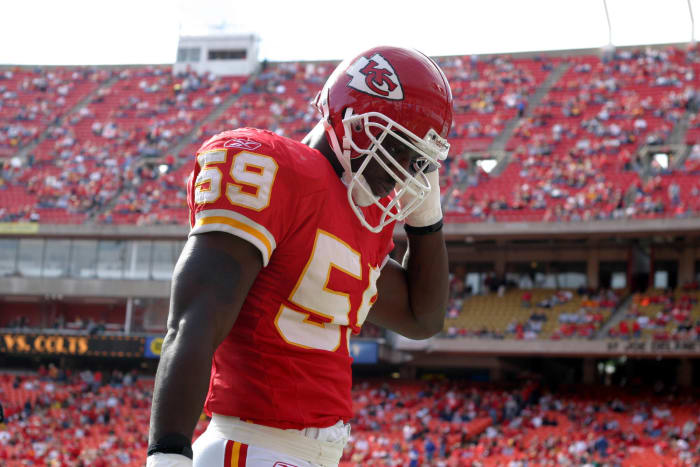
Dıck Vermeil's Chiefs assembled one of the great O-lines in NFL history. Tony Gonzalez played alongside that unit. Kansas City trotted out elite offenses throughout Vermeil's five-year tenure but could not fix its defense. Buoyed by their offense and Dante Hall's return wizardry, the 2003 Chiefs went 13-3. After a 3-8 start in '04, a team projected to challenge the fast-forming Tom Brady-Peyton Manning AFC aristocracy sputtered to 7-9. Priest Holmes' knee injury effectively ended his prime, and the Chiefs deemed 2003 first-round pick Larry Johnson unready. Amazingly, Kansas City trotted out largely the same defense from its porous '03 unit. Despite a four-Pro Bowler offense, the formula failed.
2008 Dallas Cowboys

After a 13-3 season in the Tony Romo-Wade Phillips debut, the follow-up lowered expectations for the Romo era. A finger injury sidelined the hotshot QB for three games during his second full season as a starter, but he was healthy for the stretch run. The Cowboys offered up their first Romo-era late-season letdown. The team entered December 8-4 but slunk to 9-7, ending the year with a brutal 44-6 loss to the Eagles in the "Silver Linings Playbook"-chronicled (sort of) do-or-die game. This Cowboys team rostered both Pacman Jones and Tank Johnson, and Terrell Owens clashed with teammates (Romo included, the "That's my quarterback" speech notwithstanding) and OC Jason Garrett. The Cowboys cut T.O. soon after.
2010 San Diego Chargers
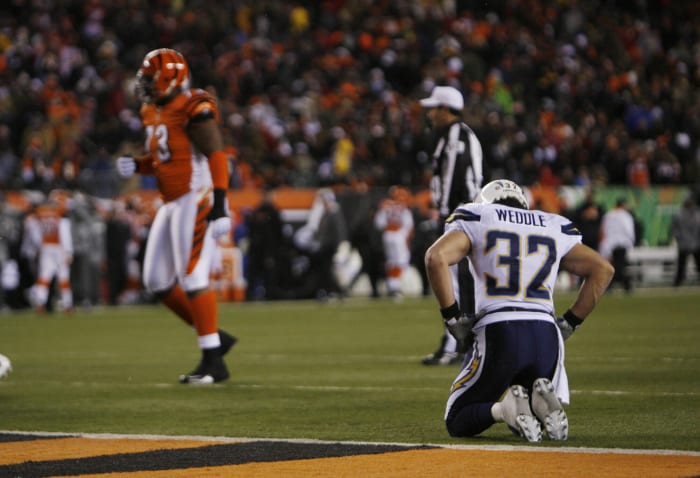
The team that laid the groundwork for "Chargers gonna Charger" is the only post-merger NFL team to rank first on offense and defense. This became an ignominious distinction. San Diego, which won the AFC West from 2006-09, finished 9-7. The Bolts cut LaDainian Tomlinson but saw an improving Philip Rivers and a prime Antonio Gates keep the offense going. The Bolts' flaw: a putrid special teams. DVOA ranked the Chargers' specialty units 32nd; they allowed four return TDs and a blocked-punt score. These Bolts started 2-5, with all five losses coming by one score, and saw late-season blowouts of the Colts and AFC West champion Chiefs come too late. The Bolts made the playoffs once between 2011-17.
2022 Los Angeles Rams
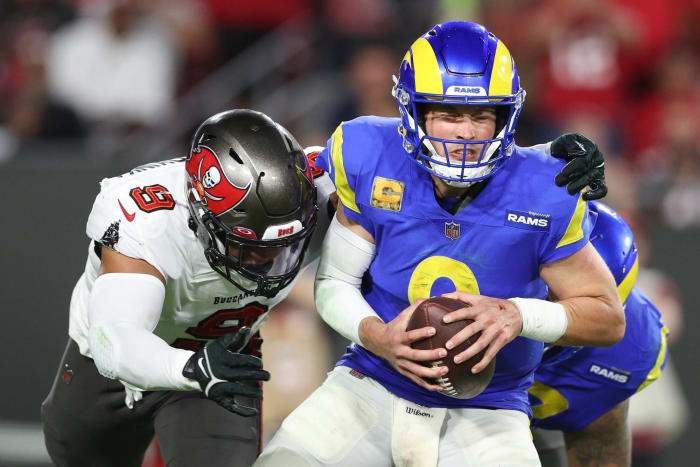
The Rams showed little signs they were prepared for a spirited defense of their Super Bowl LVI championship before injuries piled up. The team gave Matthew Stafford, Cooper Kupp and Aaron Donald offseason raises and signed Allen Robinson to complement Kupp. Sean McVay's club went 3-6 in the games Stafford played, as the 2021 trade pickup battled a nagging elbow injury. Playing behind an injury-ravaged O-line, Stafford suffered a season-ending malady. So did Kupp and Donald. All three were done by December. Although waiver claim Baker Mayfield's 98-yard game-winning drive on his third day as a Ram provided a moral victory, this 5-12 season is the worst Super Bowl title defense ever.
1998 Kansas City Chiefs

The bedrock of Marty Schottenheimer's Chiefs teams, Kansas City's defense tumbled from first to 22nd between the 1997 and '98 slates. The team's Chester McGlockton and Leslie O'Neal signings did not sufficiently move the post-Neil Smith needle alongside Derrick Thomas. Following an October win in a monsoon, the Chiefs were 4-1. They lost six straight, bottoming out with an ugly Monday-night loss to the Broncos that involved a Thomas-centered personal-foul spree, and finished 7-9. This year also became a QB pivot point for the Chiefs, as 1997 signing Elvis Grbac struggled through his worst season. The Chiefs, who had earned the AFC's top seed in 1997, still chose Grbac over Rich Gannon, the future MVP who left in 1999.
1981 Cleveland Browns
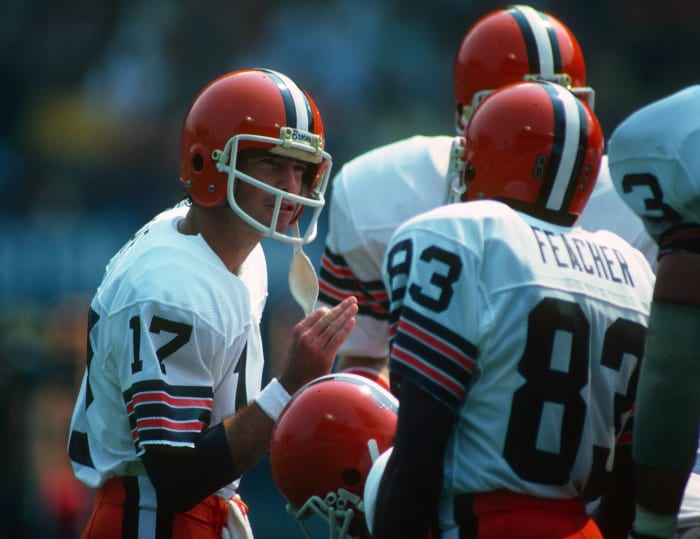
Despite the agony of "Red Right 88," the Browns still entered 1981 as the defending AFC Central champs with a reigning MVP. But the Brian Sipe-led Kardiac Kids could not recapture 1980's magic, falling to 5-11. Sipe started 16 games, and Mike Pruitt and Ozzie Newsome, respectively, offered 1,000-yard rushing and receiving seasons. But Sam Rutigliano's team ranked 23rd (out of 28 teams) in scoring. The Browns lost seven of their final eight. Sipe led the league with 25 INTs, and the Browns closed out the season with a 10-turnover game in a loss to the Seahawks. This nucleus would be mostly gone by the time Bernie Kosar arrived four years later.
2023 Philadelphia Eagles

The Eagles' 11-6 record stands out on this list, but it deceives. Entering the season as the NFC favorite, the Eagles were 10-1 after beating the Chiefs and Bills in back-to-back weeks. Philly's point differential presented signs of trouble, and rough waters soon sank the defending NFC champs. The Eagles lost five of their final six, including routs at the hands of the 49ers and Cowboys, and demoted their defensive coordinator in mid-December. Their Sean Desai-for-Matt Patricia change-up may have made matters worse, as the team imploded in a one-sided wild-card loss to the 9-8 Buccaneers. Forced to fire both his coordinators, Nick Sirianni went from a three-point Super Bowl loss to the hot seat in a year.
2019 Cleveland Browns
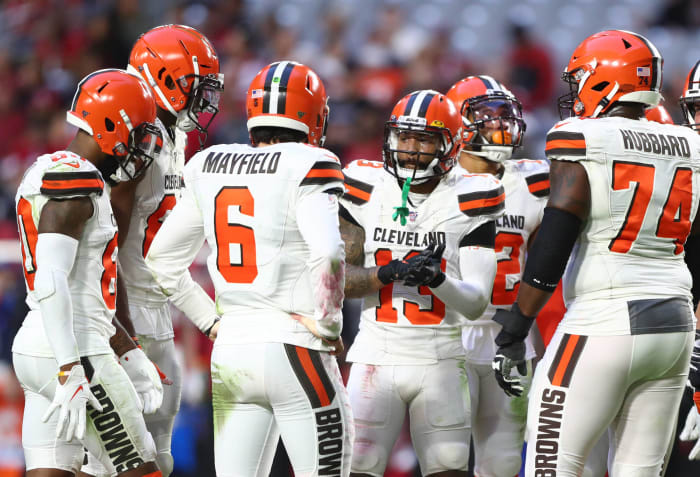
Prematurely anointed after the Odell Beckham Jr. trade, the Browns saw their equation bomb quickly. After the Baker Mayfield-Freddie Kitchens combo led to a glimmer of hope to close 2018, Cleveland's decision to promote Kitchens backfired. The Browns finished 6-10 during a season that saw Mayfield regress and the team become a dysfunctional mess. This peaked with the Myles Garrett helmet swing, taking an All-Pro-caliber player off the field, and Kitchens soon exacerbated the turmoil with an ill-advised T-shirt choice. This season began -- the Browns' last in hideous uniforms -- OBJ's midcareer swoon, preceding an ugly divorce, and began to reveal cracks in the Mayfield-Cleveland foundation.
1990 Minnesota Vikings

In their first full Herschel Walker season, the Vikings finished 6-10. Minnesota's underrated late-1980s teams each reached the divisional round, with the 1988 and '89 squads ranking first defensively. That fell apart in 1990. Ace defensive tackle Keith Millard suffered a career-changing ACL tear, though three other Vikes defenders (including sack master Chris Doleman) made the Pro Bowl. Walker rushed for just 770 yards in 16 games, with new starting QB Rich Gannon not quite ready for primetime. This combination doomed the biggest trade in NFL history, with the Vikings starting 1-5 en route to the draft position that further ignited the Cowboys' dynasty.
2001 Tennessee Titans
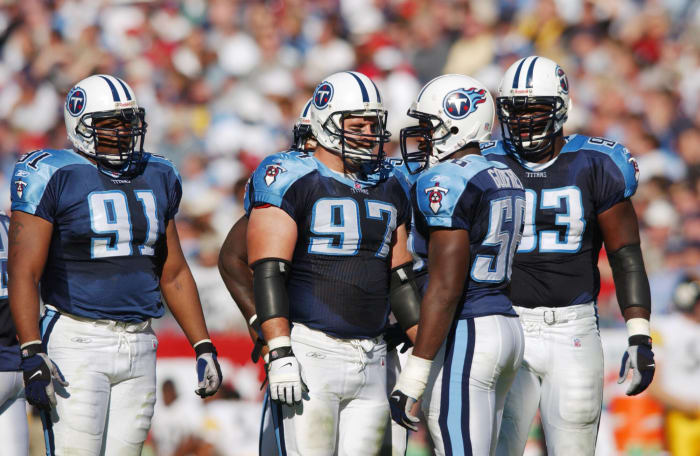
Picked by many to be the AFC's Super Bowl representative, the Titans closed out a Jeff Fisher special in a 7-9 slate. The second of Fisher's five seven-win seasons saw Tennessee's defense fall off a historically high perch. The 2000 Titans' 11.9 points per game allowed ranks third in the 16-game era; the '01 squad tumbled to 25th in its own season. This came despite the Titans trading a first-round pick for defensive end Kevin Carter, whom they paired with ascending star Jevon Kearse. Carter finished with two sacks in 16 games. Steve McNair made the Pro Bowl, but the Titans closed out the year with losses to the lowly Bengals and Browns.
2013 Washington
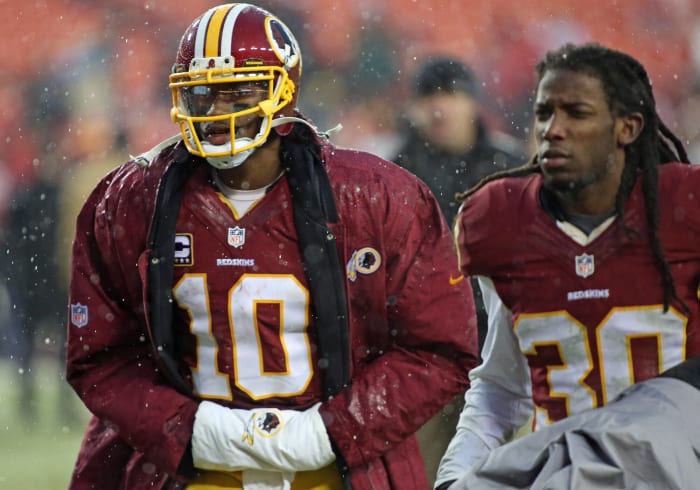
This team's expectations were not quite on the level of most included here, but 2013 changed the course of modern Washington history. Robert Griffin III beat out Russell Wilson and Andrew Luck for Offensive Rookie of the Year honors, deservedly so, but sustained an ACL tear in the 2012 wild-card round. Griffin re-emerged for Week 1, only everything changed. As tension developed between RG3 and a Mike Shanahan staff that housed Kyle Shanahan and Sean McVay, Washington cratered. The team went from 10-6 to 3-13, leading to the Shanahans' exits. This season changed Griffin, who cost a bounty to acquire, from a possible franchise QB to one quickly destined for backup duty.
2003 Oakland Raiders
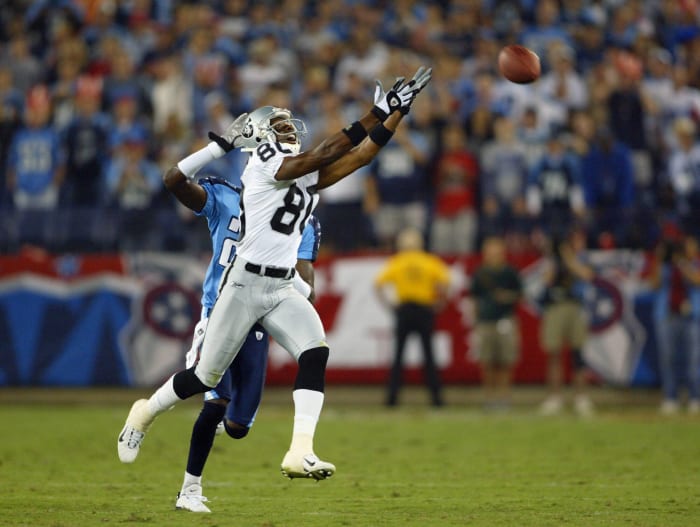
Perhaps the NFL's defining wheels-falling-off season featured an aging Raiders team getting old together. Rich Gannon's 2002 MVP season gave way to an injury-limited 2003, but the 17th-year QB had the defending AFC champs at 2-5 when he went down. Jerry Rice and Tim Brown's numbers dipped with Rick Mirer primarily targeting them, and the defense's Hall of Fame-bound Woodsons (Rod and Charles) could not stop a freefall on that side of the ball as well. The Raiders finished 4-12 during a year in which Bill Callahan, who called his experience-laden squad "the dumbest team in America," went from Super Bowl coach to the chopping block. This ushered in a rather lengthy stretch of Raider futility.
1990 Los Angeles Rams

Coming off an NFC championship game berth, the Rams did not challenge for a Super Bowl. The much-hyped team instead faceplanted with a 5-11 record, keying a woeful stretch that led the team out of Los Angeles. Although Jim Everett made his only Pro Bowl, the Rams' defense did not match 1989's level and finished last against the pass. The team cut All-Pro cornerback LeRoy Irvin in the offseason but still rostered future Hall of Famer Kevin Greene. Still, the team started 1-4 and dropped its final four games. The Rams' Everett-Greene-Jackie Slater-Henry Ellard core steadily splintered; the team lost at least 10 games from 1991-98.
2000 Washington

The team that signaled Dan Snyder may not be a good thing for Washington gathered a collection of aging superstars; the second-year owner's splurge did not produce a winner. Snyder spent to acquire Deion Sanders, Bruce Smith, Andre Reed, Jeff George, and Mark Carrier (the safety, not the wideout). Washington blew Sanders away with 2000's top free agency deal, only to see him retire after one season, and gave George a four-year, $18.25 million accord to be Brad Johnson's backup. Washington, which did have four Hall of Famers on this team (feat. NFL sophomore Champ Bailey), went 8-8. This signaled a mostly terrible 20-year stretch was ahead.
2010 Minnesota Vikings

Brett Favre's third unretirement could not produce the Super Bowl-caliber season his second such decision did. Vikings veterans Jared Allen, Steve Hutchinson, and Ryan Longwell trekked to Mississippi and convinced Favre to lead another strong roster, but the Hall of Famer's 20th season was well off the level of his MVP-caliber 19th. Minnesota dipped from 13-3 in 2009 to 6-10. Favre's games-played streak finally snapped that December and the Vikes' decision to reacquire Randy Moss via trade backfired spectacularly. Moss clashed with HC Brad Childress, teammates, and the media (and a Twin Cities-area catering staff) and only played four games as a Viking before being waived. Favre retired for good at the season's end.
1990 Denver Broncos

The 1989 Broncos remain the Super Bowl margin-of-defeat kingpins (55-10 at the 49ers' hands); their hangover was elite, too. After being the AFC's only double-digit win team in 1989, the Broncos finished 5-11 the following year. Injuries, arrests, and blown leads doomed Denver, but the AFC's Super Bowl representative in three of the previous four seasons saw the clash between the two faces of the franchise -- John Elway and Dan Reeves -- become the top storyline. The Broncos lost six straight during the season's second half, slinking into an unheard-of (during the Elway years) 3-10 place. Unlike 1990's other letdown franchises, the Broncos recovered a year later by venturing to the AFC title game.
2005 Philadelphia Eagles

Antonio Brown had to toil for a bit to topple Terrell Owens for wide receiver-distraction supremacy. Owens submitted a diva masterpiece in 2005. It largely sunk the defending NFC champions. A contract squabble (a year after Owens signed his first Eagles deal), leading to the driveway sit-up scene, came after Owens took shots at Donovan McNabb and engaged in a shouting match with Andy Reid. The Eagles went 4-3 with Owens but finished 6-10, having followed the 2003 Buccaneers' lead (Keyshawn Johnson) by banishing their high-maintenance WR1 midseason. Although Owens later caused trouble in Dallas, this season served as the main reason the superstar became a third-ballot Hall of Famer.
2011 Philadelphia Eagles

The lockout condensed the 2011 offseason into several late-summer days, and a consensus formed around the Eagles -- who had made three straight playoff berths -- winning that frenzied period. Ace cornerback Nnamdi Asomugha, rising corner Dominique Rodgers-Cromartie, D-linemen Jason Babin and Cullen Jenkins, and guard Evan Mathis comprised a monster offseason haul. ESPN's Matthew Berry advised fantasy GMs to take Michael Vick first overall. The controversial QB could not replicate his 2010 Pro Bowl season, and the Eagles -- despite ranking in the top 10 on offense and defense -- went 8-8 to turn Vince Young's "Dream Team" reference into a punchline. This combustion led Andy Reid out of town a year later.
2002 St. Louis Rams

Kurt Warner's Rams unraveling brought one of the stranger chapters in modern QB history. The two-time MVP missed 10 games due to injury, but the Rams were 0-6 with their superstar starter. Viewed as ready to shake off its Super Bowl XXXVI upset loss, St. Louis started 0-5 and could neither score nor defend. The Warner-led "Greatest Show on Turf" offense ranked 23rd in scoring; the oft-maligned Ram defense matched that ranking in a shocking 7-9 season. Remnants of that stratospheric offense remained, with Marshall Faulk making the Pro Bowl and the Isaac Bruce-Torry Holt tandem each topping 1,000 yards. But Marc Bulger was suddenly at the controls. It took Warner (cut in 2004) a while to recover from this season.
1995 Cleveland Browns

While this franchise recovered quickly and became one of the NFL's 21st-century flagships, the Browns-to-Ravens metamorphosis left Cleveland football in ruins. The Browns were coming off an 11-5 1994 season, and Sports Illustrated projected them to reach Super Bowl XXX. Art Modell's November 1995 declaration he was moving the Browns to Baltimore sent Bill Belichick's fifth Cleveland season into a tailspin. The Browns were 4-4 before that announcement; they lost their next six en route to 5-11. The Browns had paid up for Pro Bowl wideout Andre Rison that year, but nothing went according to plan. The Ravens ditched Belichick and Rison in 1996. The Ravens grew into a model franchise; Browns 2.0 has never come close.
Sam Robinson is a sportswriter from Kansas City, Missouri. He primarily covers the NFL for Yardbarker. Moving from wildly injury-prone sprinter in the aughts to reporter in the 2010s, Sam set up camp in three time zones covering everything from high school water polo to Division II national championship games. He has since settled in as the husband of a track and field coach, concentrating on the NFL. Boasting an unhealthy interest in the league’s history and fashion trends, Sam is the lead writer for Pro Football Rumors and has written about the sport for Yardbarker since 2018. In addition to working as a writer/editor for a few newspapers – the Cleveland Plain Dealer and St. Joseph (Missouri) News-Press, to name two – in a former life that included some awkward awards-show hosting gigs thankfully inaccessible online, Sam has written about the Olympics for The Athletic.
More must-reads:
- Absurd Haason Reddick-Jets situation takes another head-scratching twist
- How Jets' Aaron Rodgers reacted to demotion of friend after Robert Saleh firing
- The 'No. 3 NFL draft pick' quiz
Breaking News
Customize Your Newsletter
 +
+
Get the latest news and rumors, customized to your favorite sports and teams. Emailed daily. Always free!
Use of this website (including any and all parts and
components) constitutes your acceptance of these
Terms of Service and Privacy Policy.
This site is for entertainment purposes only.
There is no gambling offered on this site.
Gambling Problem? Call 1-800-Gambler.
